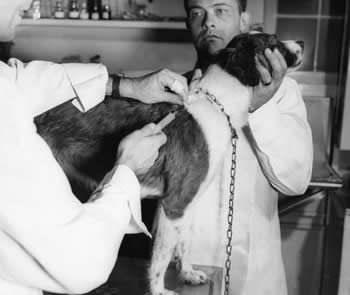Dog vaccination shots
Most common but potentially life-threatening diseases can be prevented by routine dog vaccination shots. Keep your dog safe by following your veterinarian’s vaccination advice and keeping a copy of your dog's vaccination shots record. If you are concerned about the cost of vaccination, realize that it is more economical to routinely vaccinate your dog than paying for treatment when he becomes ill.
Annual vaccinations used to be the norm, but veterinarians now believe that too-frequent vaccinations can be linked to health problems. New dog vaccination shots are given less frequently. Vaccines contain antigens that stimulate a responses in the immune system, protecting the dog against future exposure to a disease. The process of injecting a vaccine into a dog is called vaccination.
When to get dog vaccination shots? - dog vaccination shots
Newborn puppies receive natural immunity to certain  diseases by drinking their mother’s milk in the first 12 hours after birth. But this protection gradually disappears after several weeks. It is best to get dog vaccination shots at 8 weeks of age. If they receive vaccination too early, the protection from the milk fights off the vaccine. Too late, then you risk your puppy getting sick. Also, because young animals’ immune systems are immature and cannot develop long lasting immunity until 16 weeks of age, booster shots are given every 3-4 weeks. After the initial series of dog vaccination shots, your dog will need to revaccinated annually for most vaccines and others require a booster every several years. Talk to your vet and he or she will let you know when to go back for revaccination. Once again, always keep a record of your dog’s medical treatments and always bring the records with you when you visit veterinary clinics.
diseases by drinking their mother’s milk in the first 12 hours after birth. But this protection gradually disappears after several weeks. It is best to get dog vaccination shots at 8 weeks of age. If they receive vaccination too early, the protection from the milk fights off the vaccine. Too late, then you risk your puppy getting sick. Also, because young animals’ immune systems are immature and cannot develop long lasting immunity until 16 weeks of age, booster shots are given every 3-4 weeks. After the initial series of dog vaccination shots, your dog will need to revaccinated annually for most vaccines and others require a booster every several years. Talk to your vet and he or she will let you know when to go back for revaccination. Once again, always keep a record of your dog’s medical treatments and always bring the records with you when you visit veterinary clinics.
How frequently vaccinations should be boosted after the first series is currently a matter of discussion in the veterinary community. Some recommend a 2 or 3 shot series of the core vaccinations for puppies, spaced 3-4 weeks apart, followed by a booster at one year of age, and boosters every three years thereafter. Others prefer to do blood test periodically to determine whether a booster shot is necessary.
What diseases are prevented by dog vaccination shots? - dog vaccination shots
Dogs receive vaccines that protect against: Canine Parvovirus, Canine Distemper, Infectious Canine Hepatitis, Canine Parainfluenza Virus, Adenovirus, Rabies, Coronavirus and Leptospirosis. The used to receive on combination vaccine against all of those diseases called DHLPPC or DALPPC. Now, because of concerns that too many vaccines at once can overload the immune system and be harmful, some owners and veterinarians are choosing to spread them out, giving only one or two at a time.
Most people agree the core vaccines -distemper, adenovirus, parvovirus, and rabies - are essential for all dogs. The non-core vaccines should be limited to dogs who are realistically at risk of exposure to the specific infectious agent. Because while dog vaccination shots are generally safe, they're not without risk. In rare cases, it can result in allergic reactions and seizures. Certain breeds like Miniature Dachshunds, Highland Terriers, English Sheepdogs and Akitas have increased risk of such reactions.
Immune for life? - dog vaccination shots
No vaccine is 100% effective all the time. Factors that can affect the immune system in a dog can affect the effectiveness of a vaccine. Part of petting a dog is knowing when your dog is ill. Signs of illness include loss of appetite, increased thirst, abnormal discharges, abnormal lump, sudden loss of hair, excessive head shaking, limping or difficulty getting up, and noticeable weight gain or loss. Consult your veterinarian if your dog shows any sign of illness.
Just like for humans, giving your dog a health dog diet and providing plenty of exercise are great ways of strengthening his immune system and reduce the risk of illness. Good grooming habit and dental care will reduce oral diseases. To ensure good dental health, a dog's teeth need to be brushed daily using a special toothbrush and toothpaste for dogs. Read more about ways to keep your dog healthy on this website.
